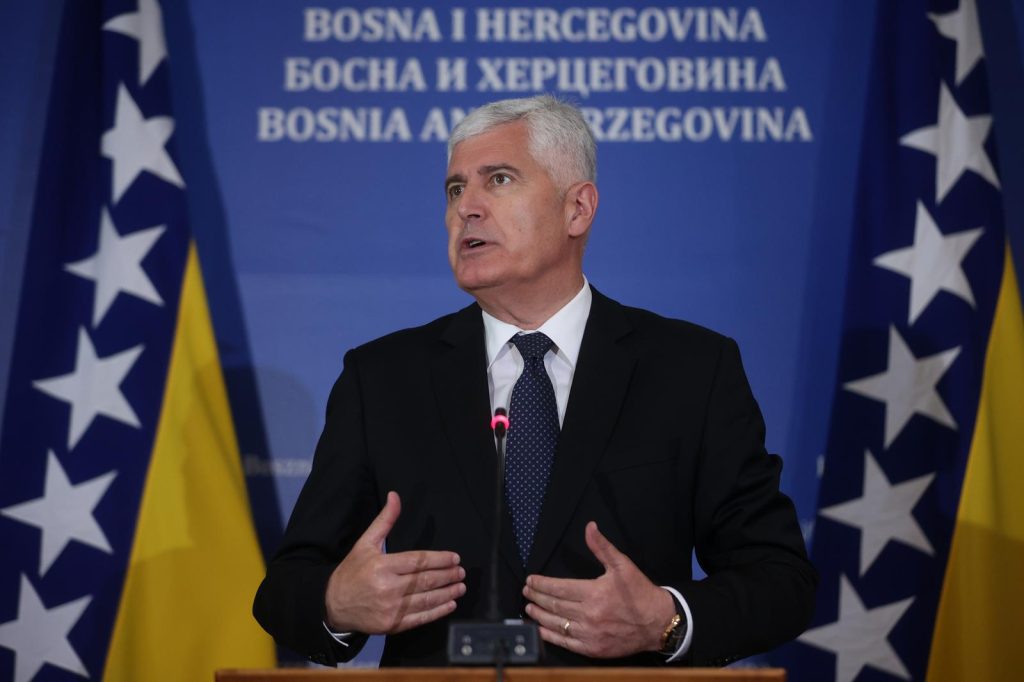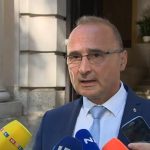A source close to Čović said on Monday that he would support the document today, with an additional “two minor changes that should not be problematic.” The changes will give an additional value to the text, the source said.
The leaders of 12 Bosnian Muslim (Bosniak) and Serb parties endorsed the document in Brussels on Sunday, committing to the electoral law reform and a limited amendment to the Constitution within six months since the formation of authorities at all levels.
European Council President Charles Michel had arranged for 15 parliamentary parties from Bosnia and Herzegovina to meet in Brussels on Sunday. In attendance were representatives of 12 parties who endorsed the document “Political agreement on principles for ensuring a functional Bosnia and Herzegovina that advances on the European path”.
Milan Šarović of the Serb Democratic Party (SDS) and Fahrudin Radončić of the Bosniak SBB parties did not travel to Brussels, while Čović did but did not show up at the meeting and later explained that he did not want to give legitimacy and promote the two Bosniak members of the country’s presidency and that he had learned just a few days before the meeting that it would be held in “a strange format”.
On Monday the Bosnian Croat leader announced his support for the document.
The preamble reads among other things that the signatories are committed to “upholding the principle of the rule of law and conduct free and democratic elections as well as develop democratic institutions at all levels of government/authority.”
Čović is proposing that this should be extended by adding “in compliance with the agreement on the implementation of the rulings of the European Court for Human Rights, signed in Brussels on 1 October 2013, and in line with the political agreement on amending the electoral law, signed in Mostar on 17 June 2020.”
Čović and the leader of the Bosniak SDA party, Bakir Izetbegović signed a political agreement in Mostar on 17 June 2020 regulating the model of election of councillors in that southern city and amending the city statute.
The 17 June 2020 political agreement made it possible for elections to be held in Mostar for the first time since 2008.
The signatories of that agreement also undertook to make sure that the amendments to the Bosnia and Herzegovina electoral law would be based on “the legitimate election and legitimate political representation” of the constituent peoples and citizens at all administrative and political levels, in the country’s presidency and in the houses of people in the state and the federation’s parliaments.
Amending paragraph 11
Čović also demands the amending of paragraph 11 of the Brussels document which now reads that the parties are committed to adopting, within six months from the formation of the authorities at all levels, “electoral reforms and those limited constitutional reforms needed to ensure full compliance with the judgments of the European Court of Human Rights and the Bosnia and Herzegovina Constitutional Court, Venice Commission recommendations and OSCE/ODIHR and GRECO recommendations.”
The proposed amendment says that the electoral reforms that will ensure the implementation of the election results in connection with the Houses of People should be urgently adopted in line with the agreements cited in the preamble, which is in line with the 1 October 2013 Brussels agreement on the ECHR rulings’ implementation and the 2020 Mostar political agreement.
On Sunday evening, Čović raised the question of how it would be possible to establish the authorities after the crucial provision of the electoral law was declared null and void.
“However, it is a crucial issue how one can establish the authorities if you do not have crucial provisions already declared null and void by the Constitutional Court,” said Čović.
The Bosnia and Herzegovina Constitutional Court invalidated a provision under which the national clubs in the House of Peoples of the Federation of Bosnia and Herzegovina must include at least one representative of the respective people from each canton. This provision enabled the Bosniak parties from the Federation’s cantons in which there were actually no Croats to get politicians who wrongfully declared themselves as Croats to become the delegates on behalf of the non-existent Croat communities and thus automatically be added to the national club of the Croats.
Each of the three national clubs (the Croat, the Serb, and the Bosniak), has 17 members, and the Croat club usually could not reach agreement and decisions because a two-thirds majority vote is required and the Bosniaks managed to add 6 purported Croat delegates to that club.
Meeting’s participants say they have not signed the document but endorsed it
Participants in the Brussels meeting said in Sarajevo on Monday that they had not signed the document but only endorsed the paper published by European Council president.
For more, check out our politics section.











